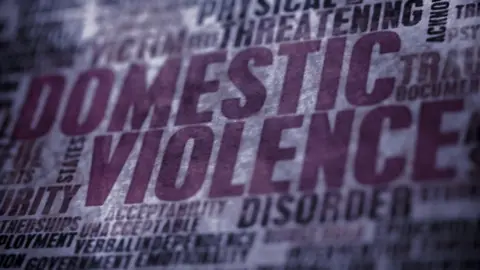Coronavirus: Three domestic killings since lockdown began
 Getty Images
Getty ImagesThis article was changed on 1 May when the justice minister said there had been three domestic killings since the start of the lockdown.
On 28 April Naomi Long told the assembly there had been four such deaths during a debate on a new domestic abuse bill.
But on 30 April Mrs Long wrote to the speaker to correct the record.
Mrs Long said it had since been confirmed by the PSNI the fourth case had been a suspected domestic killing, but was now not being treated as murder.
There have been three domestic killings in Northern Ireland since the start of the coronavirus lockdown, the justice minister has said.
Naomi Long revealed the figure on Tuesday as the assembly debated legislation that will strengthen domestic abuse laws.
Almost 2,000 domestic abuse calls were made to police in the first three weeks of April, during the Covid-19 lockdown.
Ms Long said the victims have been the "driving force behind this bill".
She added that there was work ongoing on a "multi-agency basis" to form a "joined up response at this specific time".
Earlier, it emerged that the PSNI had already recorded an increase in reports since restrictions were imposed last month.
From 1 to 21 April, there were 1,919 domestic abuse calls to police, new figures show - a 10% increase on about 570 usually received each week.
Convictions for the most serious domestic abuse offences will carry a penalty of up to 14 years in jail.
The legislation will also make a form of bullying, known as coercive control, an offence in NI for the first time.
'Police are here for you'
Last month, the PSNI Chief Constable Simon Byrne had said there could be a risk of increased domestic abuse incidents during the coronavirus pandemic.
Domestic abuse victims needed to know the PSNI was there to help, despite the crisis, said Det Supt Anthony McNally on Tuesday.
 Getty Images
Getty Images"In the last week alone, from 15-21 April, there were 611 calls," he said.
There were 585 domestic abuse calls during the week of 1-7 April and 723 from 8-14 April, he added.
"While these figures tell us that victims are finding the courage to pick up the phone and call us, we must never forget that behind each of these calls is a victim who is experiencing a harrowing ordeal at the hands of their perpetrators.
"I want to reassure victims of domestic abuse that we are here for you and we will support you in every way."
Law to go further than GB?
Coercive control includes psychological, emotional or financial abuse and non-violent intimidation.
It has been a crime in England and Wales since 2015, but Northern Ireland has lagged behind as the legislation fell when the assembly collapsed in January 2017.
In 2019, the UK government said it would pass a domestic abuse bill that would also apply to Northern Ireland.
But after the power-sharing institutions were restored at Stormont earlier this year, Justice Minister Naomi Long said one of her main priorities was to bring more comprehensive legislation through the Northern Ireland Assembly as quickly as possible.
Longer sentences
The bill means domestic abuse offences in Northern Ireland will no longer be limited to physically violent behaviour.
The effect that domestic abuse can have on children is also reflected in the legislation, with enhanced sentences possible in cases where:
- The victim in a relationship is aged under 18
- Where a child sees, hears or is present during an incident of abuse
- Where a child is used to abuse a victim
The bill will not extend to stalking, but the Department of Justice previously said a separate piece of legislation to cover that issue would be drafted at a later stage.
There have been calls for the bill to include provision for a domestic abuse commissioner for Northern Ireland, but the minister has previously ruled this out, saying she believes it would cost too much and would prefer resources to go directly towards helping support domestic abuse groups.
A number of Stormont parties including the DUP, Ulster Unionists and the Greens, have urged Mrs Long to reconsider.

Examples of coercive control:
- Being stopped from working or going to school/college/university
- Having money taken away or controlled
- Being isolated from friends and family
- Having access to food, drinks and day-to-day products restricted
- Having their social media accounts monitored or controlled
- Being told what they should wear
- Being threatened with violence if they do not behave in a certain way
- Having threats made to loved ones or pets
Read more from BBC Newsbeat: How to tell if your partner's controlling you

Between July 2018 and June 2019, there were 16,575 domestic abuse crimes recorded in Northern Ireland - the highest since records began in 2004/05.
Last month, PSNI Chief Constable Simon Byrne said he also recognised the risk of increased domestic abuse incidents during the coronavirus pandemic.
"So far, fortunately, it's not a dramatic increase, but we are monitoring all sorts of different crime and incident levels every day," he said.
"As people frankly spend more and more time together, we're acutely aware of the risk and the need to protect vulnerable people."
The domestic abuse bill is being debated by assembly members for the first time on Tuesday, but it will still face several further stages of scrutiny before it becomes law.
It is thought it could take until next spring before the legislation becomes law and an implementation period will then be needed before it becomes fully operational.
